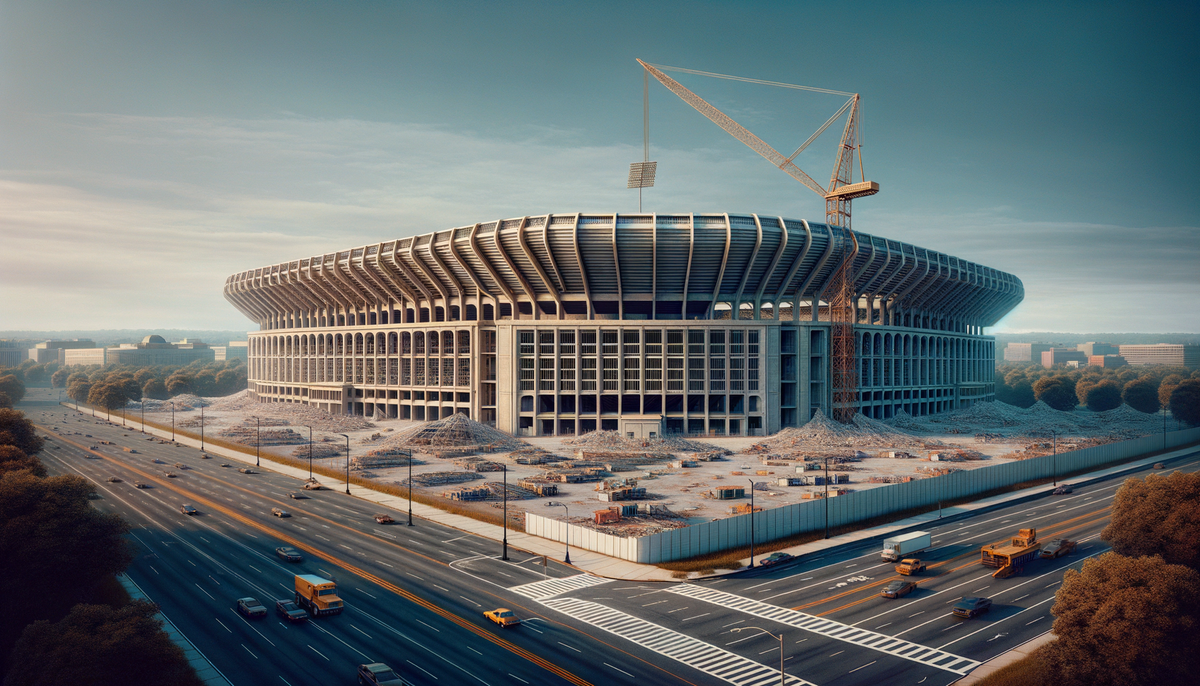RFK Stadium: A Nostalgic Glimpse into Washington's Sporting Legacy
Explore the storied past and future rebirth of Washington, D.C.'s RFK Stadium, a symbol of sports and community, as it approaches demolition for redevelopment.

RFK Stadium: A Nostalgic Glimpse into Washington's Sporting Legacy
The iconic Robert F. Kennedy Memorial Stadium, commonly known as RFK Stadium, is set to be demolished, marking the end of an era for Washington, D.C.'s sports enthusiasts and its historical fabric. In this article, we delve into the historical significance, architectural marvel, and the legacy of RFK Stadium—a pivotal element in Washington's sports and cultural identity.
Historical Overview of RFK Stadium
Opened in 1961 as D.C. Stadium, and renamed in 1969 to honor Senator Robert F. Kennedy, RFK Stadium quickly became a fixture in American sports history. It was one of the first major venues designed for dual purposes: hosting both baseball and football, a new trend during the 1960s known as "cookie-cutter" stadiums. These multi-purpose stadiums were characterized by their large, circular or oval structures that could easily be reconfigured for different sports.
According to ESPN, RFK Stadium housed both the Washington Redskins of the NFL and the Washington Senators of Major League Baseball, becoming a go-to venue for fans of both sports. It held a special place in fans' hearts for 36 seasons, serving as the Redskins’ fortification and witnessing their glory years.
RFK Stadium's Key Tenants and Memorable Events
For the Washington Redskins, RFK was more than just a stadium; it was where legends were made. Between 1961 and 1996, the team recorded an outstanding home playoff record, famously clinching five NFC Championship Games on its field. Similarly, it was home to the Washington Senators until 1971, at which point the baseball franchise moved to Texas.
Beyond baseball and football, RFK Stadium also hosted other tenants including the Washington Federals of the USFL, college bowl games, and even high-profile concerts. This versatility made it a cherished venue for Washington's community gatherings and cultural events.
Architectural and Cultural Impact
RFK Stadium's innovative design was a landmark of its time. The ability to switch between baseball and football games practically overnight due to its circular multi-use design was revolutionary, influencing the architecture of similar stadium projects in subsequent years.
Notably, cities like Philadelphia, Pittsburgh, and Cincinnati embraced this model. Yet, even with its architectural foresight, what stood out most was RFK's role in the cultural identity of Washington, D.C. The stadium was entwined with the community, bearing witness to both sports triumphs and historic gatherings.
Nearing the End: Decline and Upcoming Demolition
As the years progressed, the stadium fell into disrepair following the departure of its marquee tenants. The Redskins moved to FedEx Field in 1996, and over time, the need for a modern, state-of-the-art venue became imminent. Plans to demolish the decaying structure were set in motion by 2024, closing a significant chapter in D.C.'s sports chronicles.
The impending demolition has been met with a sense of nostalgia, but also excitement for the future developments planned for the RFK site. The Washington Commanders have announced an agreement to build a new stadium on the RFK site, as reported by NBC Washington, set to transform the area into a modern sports and entertainment complex.
Legacy and Takeaways
The legacy of RFK Stadium endures, not just in the memories of its games and events but also as a foundational influence on modern stadium design. It was a forerunner in multi-purpose venues, which today accommodate a vast array of events under one roof.
For professionals and stakeholders in the stadium and sports facilities industries, the RFK story offers practical insights into the lifecycle of major venues, the importance of adaptability in design, and the community bonds that such structures can foster.
How This Relates to Our Expertise
At Newsomix, we pride ourselves on staying at the forefront of stadium technology and design. Our expertise in innovative solutions and high-impact sports marketing positions us as thought leaders in the realm of sports architecture and community-focused venue management. We understand the challenges and opportunities in stadium renewals and build-outs.
As the Washington area prepares for a new chapter at the RFK site, consider how your ventures can align with emerging market needs. Our extensive experience can guide your strategies in sports venue planning and investments.
Explore the Future of RFK Stadium
The demolition of RFK Stadium marks the end of a historic era. Still, it simultaneously heralds new opportunities for innovation and development in the heart of Washington, D.C. The new stadium promises to continue serving as a nexus for sport, recreation, and community.
Visit us at Newsomix.com to explore exciting opportunities at the RFK site and what it could mean for your business. Engage with the future of sports venue excellence—we are here to help you navigate the dynamic landscape of stadium development.




